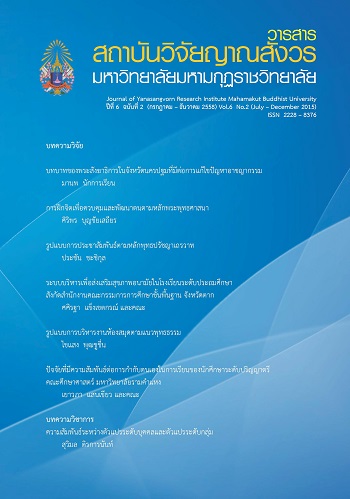Form of Public Relation According to Theravada Buddhist Philosophy
Main Article Content
Abstract
The objectives of this dissertation were as follows : 1) to study the Public Relation, 2) to study the Public Relation According to Theravada Buddhist Philosophy, 3) to Integration of Public Relation According to Theravada Buddhist Philosophy, and 4) to establish a new knowledge about the pattern of the Form of Public Relation According to Theravada Buddhist Philosophy. The research was a qualitative study by studying and analyzing data collected from the Tipitaka and other relating texts and documents along with in-depth interview with 2 monks and 4 experts Theravada Buddhism and public relations personnel The results showed that The release is the procedure microscopy and processes that require knowledge (Prudence) and awareness in the field of corporate social responsibility (Morality) for a mission that it must be knowledgeable in the art of public relations is critical. (Critical mind) and have features that include a virtue. Is a good idea to successful public relations benefits. The results of the analysis of data from in-depth interviews found. Integrating the promotion by the Buddhist philosophy. Has new knowledge about the form of PR. "The concept mainstream," according to the principles of the Buddhist philosophy or publicity. "The concept of the Buddha" can be applied to improving the quality of both the sender and receiver, and a communication process according to Buddhist philosophy properly. Access to the principles of Buddhist philosophy. "vijjacaranasampanno so settho deva-manuse" with the full knowledge and good conduct noblest among angels and humans. This means that the goal must be to create a full, complete knowledge and good conduct. (Knowledge and morality) at the same time.
Article Details
References
พระทิพย์ พิมลสินธุ์, การวิจัยเพื่อการประชาสัมพันธ์, พิมพ์ครั้งที่ 5, (กรุงเทพมหานคร : ประการยพรึก, 2545), หน้า 12.
สาวิตรี หมวดเมือง, “การศึกษาความต้องการและการใช้ประโยชน์จากสื่อประชาสัมพันธ์ของศาลปกครอง ศึกษากรณีข้าราชการมหาวิทยาลัยของรัฐ”, วิทยานิพนธ์วารสารศาสตรมหาบัณฑิต, (บัณฑิตวิทยาลัย : มหาวิทยาลัยธรรมศาสตร์), 2546, หน้า 17.


